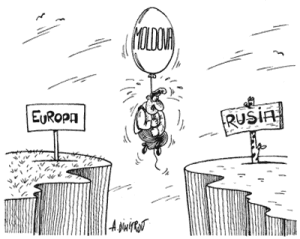Moldova on the Front Lines of Russia’s Propaganda War
In a televised address on March 17th, Moldovan President Nicolae Timofti declared his intention to ban Russian politicians from entering Moldova outside of official state-sanctioned visits. President Timofti alleged that Russian diplomats were guilty of spreading subversive, pro-Russian propaganda throughout the country, and had persisted in interfering in local election campaigns in Moldova’s autonomous territory of Gagauzia, despite repeated warnings by the Moldovan government to stop.

Timofti’s comments come after a series of victories by pro-Russian forces in Moldovan politics this year, causing domestic politicians and international observers to seriously reconsider the country’s Western tilt and EU trajectory. Despite Moldova’s signing of the EU Association Agreement last summer, the recent upsurge in pro-Russian sentiment has been hard to ignore. In Moldova’s parliamentary elections of November 2014, the pro-Russia socialist and communist parties showed a surprisingly strong turnout, resulting in a much more narrow victory for the “Alliance for Europe” coalition than previously forecasted. Moldova’s future in the EU was a major mobilizing issue in the elections, with the Socialist and Communist Parties campaigning openly as pro-Moscow and anti-Bucharest.
Gagauzia, a small region in southern Moldova, has been a major leverage point for Russian political influence in the country. Like Moldova’s breakaway region of Transnistria, the historically russified territory of Gagauzia also fought for independence from Moldova in the early 1990s. Rather than following Transnistria’s example to become a “frozen conflict,” however, Gagauzia agreed to rejoin Moldova as an autonomous region in 1994. Since then, Gagauzia’s relationship with the central Moldovan government has remained tense, and links to Russia have held strong in both economic and cultural spheres. Gagauz pro-Russian popular opinion was made unmistakably clear in a February 2014 referendum in which the local population voted overwhelmingly to reject membership in the EU in favor of absorption into Russia’s Eurasian Customs Union.
Moscow has gone to lengths to strengthen this relationship with Gagauzia, most recently supporting the socialist candidate for the territory’s newly elected governor, Irina Vlah. Vlah is an outspoken proponent of the Eurasian Union as well as of the closer cooperation of “the brotherhood of Gagauz and Russian peoples.” According to the central Moldovan government, however, Russia’s influence in Gagauzia has overstepped its bounds, devolving into a political force that is openly hostile and subversive to the central government in Chisinau.
In a recent statement endorsing Vlah, an unnamed Russian deputy commented, “We know that Gagauzia speaks Russian perfectly and that every Gagauz citizen considers himself a part of the Russian world. But, unfortunately, the government of Moldova complicates relations with Russia, causing the Gagauz to suffer.” Such brazen and propagandistic statements, designed to sabotage Moldova’s movement toward achieving EU membership, prompted President Timofti’s proposed ban of Russian politicians from unauthorized entry into the country. Whether Timofti’s actions will be enough to slow the momentum of Russian propaganda in the country remains to be seen.
In the wider sense, it is clear that the problem of subversive Russian propaganda is not unique to Moldova. Russian minority and Russian-speaking regions are sprinkled throughout the post-Soviet space, causing particular alarm in the Western-leaning governments of Ukraine, Georgia, and the Baltics. The EU recently recognized the prevalence of Russia’s “disinformation campaign” in former Soviet bloc countries as a major security concern, prompting Brussels to develop an action plan on “strategic communication” in Eastern Europe in addition to continued commitment to their ongoing economic sanctions against Russia. Up to this point, however, EU attention to capturing hearts and minds in areas of high Russian sympathies has been conspicuously lacking. It may prove difficult to turn the tide of the Russian propaganda machine, which has been running at full force. Like President Timofti’s ban, these EU actions run the danger of simply being too little, too late.
